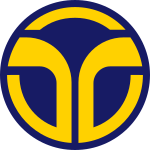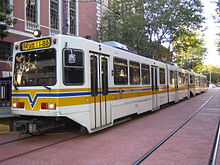Sacramento RT Light Rail
| Sacramento RT Light Rail | |||
|---|---|---|---|
 | |||
 A Siemens Duewag U2A in downtown Sacramento | |||
| Overview | |||
| Locale | Sacramento, CA | ||
| Transit type | Light rail | ||
| Number of lines | 3 | ||
| Number of stations | 54[1] | ||
| Daily ridership | 38,900 average weekday riders (Q3 2017)[2] | ||
| Annual ridership | 13.873 million (2012)[3] | ||
| Website | Sacramento Regional Transit District | ||
| Operation | |||
| Began operation | March 12, 1987[4] | ||
| Operator(s) | Sacramento Regional Transit District | ||
| Number of vehicles | 36 Siemens-Duewag U2A vehicles and 40 CAF Class 200 vehicles[4] | ||
| Technical | |||
| System length | 42.9 mi (69.0 km)[1] | ||
| Track gauge | 1,435 mm (4 ft 8+1⁄2 in) (standard gauge) | ||
| Electrification | Overhead lines, 750 V DC | ||
| |||
Sacramento RT Light Rail | |||||||||||||||||||||||||||||||||||||||||||||||||||
|---|---|---|---|---|---|---|---|---|---|---|---|---|---|---|---|---|---|---|---|---|---|---|---|---|---|---|---|---|---|---|---|---|---|---|---|---|---|---|---|---|---|---|---|---|---|---|---|---|---|---|---|
| |||||||||||||||||||||||||||||||||||||||||||||||||||

The Sacramento RT Light Rail system (reporting mark SCRT) is a 42.9 mi (69.0 km)[1] light rail system, consisting of three rail lines, 54 stations, and 76 vehicles. It is operated by the Sacramento Regional Transit District.
Sacramento's light rail system, with an average of 38,900 weekday daily boardings in Q3 2017,[2] is the eleventh busiest in the United States.
The creation and maintenance of the light-rail system is pushed by the advocacy group Friends of Light Rail and Transit.
History
Prior to 1980 efforts by community organizers led by the Modern Transit Society to bring light rail to Sacramento were stopped in their tracks by a pro-bus-only Regional Transit District Administration and Board of Directors.
After many months of very adverse media attention to management failures, all of the senior management was fired, and the majority of the Board either resigned or were replaced.
In 1980-81, a new Board of Directors hired a new General Manager, Bob Nelson, who had been a senior manager in the design and construction of the Bay area BART system.
A management troika of Nelson, RT General Counsel John Kettleson, and Public Affairs Director and Assistant General Manager Bill Green, was successful in completely reorganizing the agency, reversing its negative public reputation, and obtaining swift approval and funding for a bold new light rail project.
In 1987, the 18.3-mile (29.5 km) light rail “starter line” opened, linking the northeastern (Interstate 80) and eastern (Route 50) corridors with Downtown Sacramento. As light rail ridership increased, RT continued to expand the light rail system. RT completed its first light rail expansion along the Highway 50 corridor in September 1998 with the opening of the Mather Field/Mills Station. Five years later (September 2003) RT opened the first phase of the South Line, a 6.3-mile (10.1 km) extension to South Sacramento. In June 2004, light rail was extended from the Mather Field/Mills station to Sunrise Boulevard, and on October 15, 2005 a 7.4-mile (11.9 km) extension from the Sunrise station to the city of Folsom was opened.
In December 2006, the final leg of the Amtrak/Folsom project was extended by 0.7-mile (1.1 km), to the downtown Sacramento Valley Station, connecting light rail with Amtrak inter-city and Capitol Corridor services as well as local and commuter buses. Within the next several years, RT plans to extend light rail beyond Meadowview, South Sacramento, to Cosumnes River College and north to Sacramento International Airport. RT currently operates 97 bus routes in a 418-square-mile (1,080 km2) service area.
Operations and headways
Before the June 2010 budget cuts, RT light rail formerly operated from 4:30 a.m. to 1 a.m. daily with 15 minute headways during the day. After the budget cuts took place, light rail service was curtailed to operate from 4:30 a.m. to 10 p.m. daily, with service every 15 minutes Monday through Friday, and every 30 minutes on weekends and at night. In 2013, RT light rail service was restored to operate more hours again, now operating from 4:30 a.m. to 12:30 a.m. Monday through Saturday, and from 5 a.m. to 11 p.m. on Sunday, although the frequency headways remain unchanged. The only exception is the Green Line which operates Monday through Friday only from 6 a.m. to 8:30 p.m. running every 30 minutes throughout service times.
Stations
Most popular stations
Numbers provided are average weekday boardings and alights:
Blue Line – Watt/I-80–Downtown–Cosumnes River College Line
Gold Line – Downtown–Sunrise Folsom Line
Green Line – Downtown–Township 9
Future projects
Sacramento RT has several plans to expand the light rail system, but most have been placed on hold due to a lack of funding.
The most recent Sacramento Regional Transit Master Plan, adopted September 2009 included plans to extend the system to Elk Grove, Roseville, and Citrus Heights.[5]
Green Line to Sacramento International Airport
The Green Line to Sacramento International Airport light rail future extension Project will extend service 12 miles (19.3 km) to the airport via the Natomas neighborhood.[6] The line would extend northwest from the existing Green Line terminus at the 7th & Richards / Township 9 station. The plan to extend light rail to the airport has been in the works since early 1990s, and is the project most requested by residents of the Sacramento region.[7] The agency is currently completing environmental documents for the project.[8]
The project, estimated at nearly $1 billion, would be the costliest in RT's history and securing funding has been a challenge.[7] Transportation officials most recently proposed funding the project with a half-cent sales tax increase in Sacramento County, but the measure was narrowly defeated in November 2016.[9][10]
Rolling stock
The LRV fleet is composed of cars from three different builders: 36 from Siemens-Duewag U2A, some of which have been in use since the RT opened; 40 newer ones delivered in 2003 from Construcciones y Auxiliar de Ferrocarriles, and 20 Urban Transportation Development Corporation cars purchased from Santa Clara Valley Transportation Authority and refurbished by Siemens.[4]
| Numbers | Qty | Built | Manufacturer | Model | Notes |
|---|---|---|---|---|---|
| 35 | 1 | 1912 | American Car Company | "California" car |
|
| 101–126 | 26 | 1985–1986 | Siemens-Duewag | U2A | |
| 127–136 | 10 | 1990–1991 | Siemens | U2A | |
| 201 202–240 |
40 | 2002 2003 |
Construcciones y Auxiliar de Ferrocarriles |
SRV-I | |
| 301–320[11] | 20 | 1987 | Urban Transportation Development Corporation |
|
References
- ^ a b c d e f "RT Fact Sheet" (pdf). Sacramento Regional Transit District. June 2015. Retrieved 2015-09-09.
- ^ a b "APTA Ridership Report - Q3 2017 Report" (PDF). American Public Transportation Association (APTA) (via: http://www.apta.com/resources/statistics/Pages/ridershipreport.aspx). November 2017. Retrieved 2018-02-09.
{{cite web}}: External link in|publisher= - ^ "APTA Ridership Report - Q4 2012 Report" (PDF). American Public Transportation Association (APTA) (via: http://www.apta.com/resources/statistics/Pages/RidershipArchives.aspx). March 2013. Retrieved 2013-07-13.
{{cite web}}: External link in|publisher= - ^ a b c "Sacramento Regional Transit Light Rail FACT SHEET" (pdf). Sacramento Regional Transit Light Rail. February 2008. Retrieved 2007-01-23.
- ^ "Sacramento TransitAction Regional Transit Master Plan: Executive Summary" (PDF). Sacramento Regional Transit District. Retrieved 13 January 2015.
- ^ Sacramento RT website: "Green Line to the Airport" Archived 2012-05-27 at the Wayback Machine
- ^ a b Bizjak, Tony (January 7, 2015). "When will Sacramento get light rail to the airport? Not soon". The Sacramento Bee. ISSN 0890-5738. Retrieved July 10, 2018.
- ^ "Green Line to the Airport fact sheet" (PDF). Retrieved 2018-07-10.
- ^ Bizjak, Tony (2016-03-27). "Sacramento unveils $3.6 billion transportation project to-do list". The Sacramento Bee. ISSN 0890-5738. Retrieved 2018-07-10.
- ^ "What's next for Sacramento roads and transit after Measure B defeat?". The Sacramento Bee. 2016-11-23. ISSN 0890-5738. Retrieved 2018-07-10.
- ^ "Rolling Stock (LRV)". Sacramento Regional Transit. Retrieved 2016-11-03.
- ^ "Siemens-refurbished light rail vehicles to begin operating on new Sacramento Regional Transit line | Siemens USA Newsroom". news.usa.siemens.biz. Retrieved 2016-11-03.
External links
![]() Media related to Sacramento Light Rail at Wikimedia Commons
Media related to Sacramento Light Rail at Wikimedia Commons

